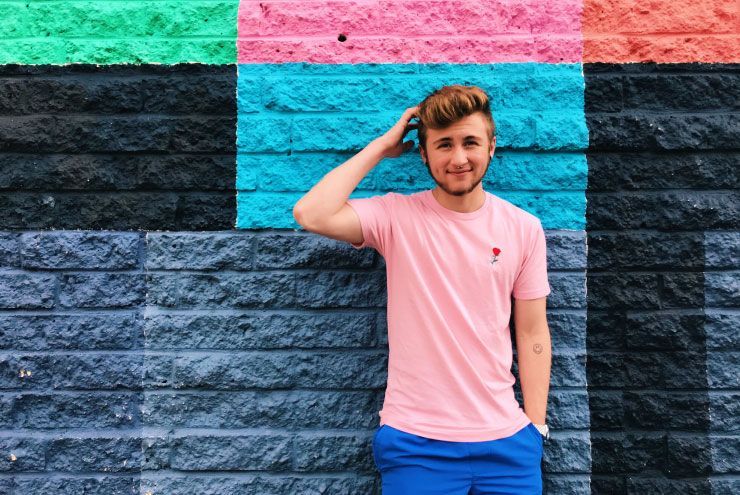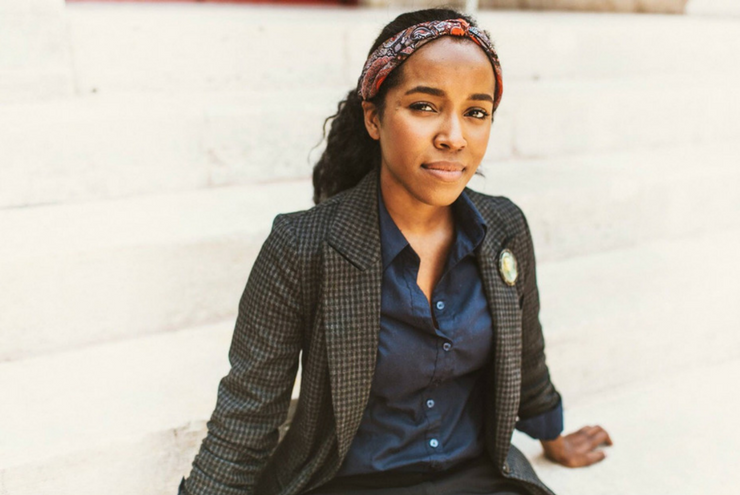Editor’s note: This is an installment of Transouthern Youth, a Spectrum South original series spotlighting transgender youth across the South.
By Megan Smith
Twenty-year-old Spencer Ray is rooted deep in the heart of East Texas. While he’s entering his senior year as a business management student at Stephen F. Austin State University in Nacogdoches, Ray has found more than a career path in the Piney Woods—he’s found pride and strength in his identity as a bisexual, transgender man.
Growing up, Ray lived across the South, moving frequently for his dad’s job. Around age 14, however, the southern comfort to which he’d become accustomed transformed into struggle. “I started reflecting on myself my freshman year in high school. I was 14 or 15,” Ray explains. “I began questioning my sexual orientation, mostly. I was [simultaneously] being bullied for my perceived sexual orientation, so I was very conflicted, because I saw myself—at the time—as a straight girl, but to other people, they assumed I was a lesbian, and I would get harassed for it. It made it very hard to accept the fact that, in the long run, I did like girls, and it also made it harder to accept the fact that I was not a girl.”
This acceptance, Ray notes, came in stages. “I sensed I was trans about age 15, but I didn’t know if I was non-binary, FTM, or where I fell on that spectrum,” he says. “But I was certain I wasn’t cis. I came out to a few friends, but then went back into the closet. I never changed my pronouns or my name or anything.” However, at the time, Ray was able to accept his sexual orientation. “I came out to my friends first, and then I was actually outed to my parents,” he shares, explaining that he first came out as bisexual, then as a lesbian. “They didn’t take it well at first. My mom’s from Alabama, so you can imagine how she was raised. But they both ended up accepting it and being pretty open with me after a few years.”
It wasn’t until Ray moved to Nacogdoches and became involved with SFA’s Pride organization that he felt safe enough to openly identify as trans, begin using male pronouns, and socially transition. He also gave himself the necessary space to reflect on how his transition impacts his sexual identity. “I became more comfortable in myself and was able to explore deeper into things that would have made me uncomfortable before,” he says. Ultimately, Ray re-came out as bisexual, an identity he now fully embraces.
SFA’s campus is a surprisingly supportive environment for LGBTQ students, Ray says, noting that the campus Pride organization has been around since 1993. He has also worked closely with the organization Lumberjacks Care to educate teachers and students on LGBTQ allyship and issues. “It’s called our ‘Safe Space Training,'” he says. “I helped create and facilitate a lot of those trainings.”
As his visibility on campus increased, so did his visibility online. Ray describes how, during his own identity journey, he actively followed LGBTQ activists using Instagram and YouTube to share their personal stories and bring awareness to the community. While Ray casually used these platforms himself, he never anticipated to grow a following that rivaled any of these influencers. That is, until he met up with activist Dominic Anthony Green at a Pride event. “We met at Pride and he posted a picture of us,” Ray says. “After that, I got to about 1,000 followers and expected it to stay there.”
But it didn’t stop there—Ray now has almost 59,000 Instagram followers and has become a role model for trans youth worldwide. He has since branched into YouTube—documenting his journeys with testosterone, top surgery, and more—and has already built up a noteworthy following on the platform. “I’m trying to get more into it now,” he says. “I’m getting more comfortable filming myself, editing, and going in to upload and share with other people. I think a lot of that comes with being more comfortable with myself.”
“The response has been great and people message me all the time about how they can look to me when they’re unsure if they themselves can transition, or when [their transition end goal] seems so far away,” Ray adds. “They look to me and see that, even if it takes a long time, this can happen for them too. If it can happen for me, it can happen for them too.”
Ray need only venture outside of the campus “bubble” to be reminded as to how much this visibility matters. “On campus, it’s great,” he shares. “But when you venture out into Nacogdoches and the surrounding areas, it’s a very different dynamic. People protested our local Target after they announced their transgender bathroom policy. There are Trump stickers and signs everywhere—it’s the little things that add up and remind you that you’re in the Deep South.”
Ray’s digital presence has also helped his family better understand his transition. “They were not happy about it and asked me to avoid physically transitioning until after I graduated college,” he says. “They thought [my transition] would distract me from my studies. But after seeing me transition—both online and when I go visit—they can tell I’m so much happier and they are now starting to use my name and pronouns. They don’t help me with my transition—they’ve made it clear that it’s my responsibility to pay for everything—but they’re not impeding me either. They’re letting me take the reins to my life.”
As he approaches graduation this December, Ray is taking another significant step for himself—moving out of the South for the very first time. Early next year, he plans to move to Denver, Colorado to kick off his career, with future aims of starting his own business. “I was always taught that my life was going to go a certain way, but it took such a drastic turn from that and that was hard to accept. So keep your mind open,” Ray reflectively advises others who are just beginning to explore their identities. “Keep learning about and accepting others, because that will ultimately lead to you learning more about and accepting yourself.”
Keep up with Spencer Ray by following him on Instagram and YouTube.







